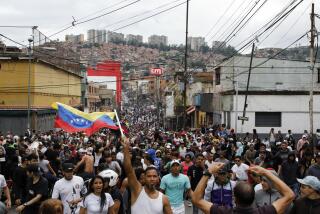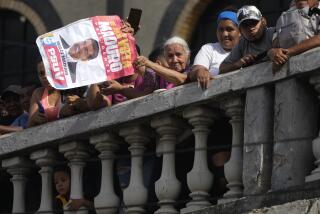Spain’s Socialists Expected to Win Easily in Vote Today : Only Question Is Whether Gonzalez Can Retain Majority in Parliament, Pollsters Say
MADRID — Felipe Gonzalez, the 44-year-old prime minister of Spain, smiled, lowered his voice and told 50,000 cheering supporters at the mass rally on the last night of the Spanish parliamentary election campaign, “Keep it up, keep it up, we are going to win.”
The smile was not smug but seemed powered by serene confidence. Gonzalez was simply reflecting the seemingly unanimous opinion of analysts and pollsters in Spain. In their view, he has about as much chance of losing the post of prime minister in the elections today as a Communist has of winning the next presidential election in the United States.
Most political discussion these days centers on tangential issues: Will Gonzalez keep his majority in the Congress of Deputies? Or will the returns force him to govern with no more than a large plurality? Will any conservative emerge as an alternative for the future?
A Rare Luxury
On one of the last nights of the campaign, for example, an influential Socialist professor spent a good deal of time at dinner worrying whether today’s returns will put his party in a good position to win the next parliamentary elections in 1990. Few democratic political parties in the world have the luxury of worrying more about future elections than the one facing them now.
In one of the most decisive electoral victories in Spanish history, Gonzalez and his Spanish Socialist Workers Party won 48.4% of the vote in the 1982 parliamentary election, taking 202 of the 350 seats in the Congress of Deputies, the main house of the Spanish Parliament.
That victory was looked on as a sure sign that the Spanish people had finally turned their backs on the fascist dictatorship of Franciso Franco, who died in 1975.
Most polls indicate some slippage for the Socialists from those heights, and a few late soundings even raise the possibility that Gonzalez could dip below the 176 seats needed for a majority. But the Socialists would still dominate Congress so much that Gonzalez, following the example of several other European heads of government without single party majorities, could rule with relative ease.
Feeble Opposition
The election could determine the future of 63-year-old Manuel Fraga, the stubborn, forceful conservative who once served as Franco’s minister of information. Fraga’s Popular Alliance won 26% of the vote and 106 seats in 1982 to finish as the main, though rather feeble, opposition party in Spain. Most polls predict that he may do even worse this time.
Fraga hurt his image among his own followers earlier this year with a disastrous campaign for voters to abstain in a national referendum on Spain’s remaining in the North Atlantic Treaty Organization. Fraga hoped to embarrass Gonzalez but instead troubled his own conservatives, who are staunch supporters of NATO.
In the end, Gonzalez won a resounding victory when almost 60% of the Spanish electorate voted to remain in NATO, and Fraga looked foolish. The sureness of this victory in March prompted Gonzalez to take advantage of the momentum and schedule early parliamentary elections in June.
Many analysts believe that the conservatives will not have any chance of supplanting Gonzalez in the future unless they find a leader who, unlike Fraga, has no ties to the old Franco regime.
The surprise of the campaign has been the relatively strong showing in the polls of 53-year-old former Prime Minister Adolfo Suarez and his centrist party, called the Democratic and Social Center. Although counted out of Spanish politics after he resigned in 1981, Suarez has enormous national standing as the prime minister who led Spain in the transition from dictatorship to democracy.
With polls indicating that his party might win as much as 10% of the vote, Suarez could be the spoiler keeping the Socialists from their majority.
Blunting a Challenge
Ironically, some Spanish journalists believe that the Socialists encouraged Suarez’s race to blunt a challenge from another centrist, Miguel Roca, a Catalan leader trying to make an impact on the national scene.
If so, the attempt only made things worse. A cartoon in the news magazine Cambio 16 last week showed Alfonso Guerra, deputy prime minister and chief political strategist for Gonzalez, puffing up the ashes of a Suarez fire until it explodes in Guerra’s face and rockets Suarez out in the form of a mighty phoenix.
A small sector of 40 seats, according to the polls, will be shared by various regional, Communist and extreme leftist parties. Santiago Carrillo, former secretary general of the Communist Party now running on an independent Communist ticket, is expected to lose his seat in Parliament.
If so, the last prominent politician who took part in the Spanish Civil War will have left the national political scene. In his campaign, Gonzalez has not been promising the voters anything new. His campaign slogan is “We are on the right track.”
The Gonzalez campaign message is a simple one: The Socialists, who have been moderate in enacting social reforms and rather conservative in their economic policy, need more time to consolidate their momentous epoch in Spanish history.
More to Read
Sign up for Essential California
The most important California stories and recommendations in your inbox every morning.
You may occasionally receive promotional content from the Los Angeles Times.










